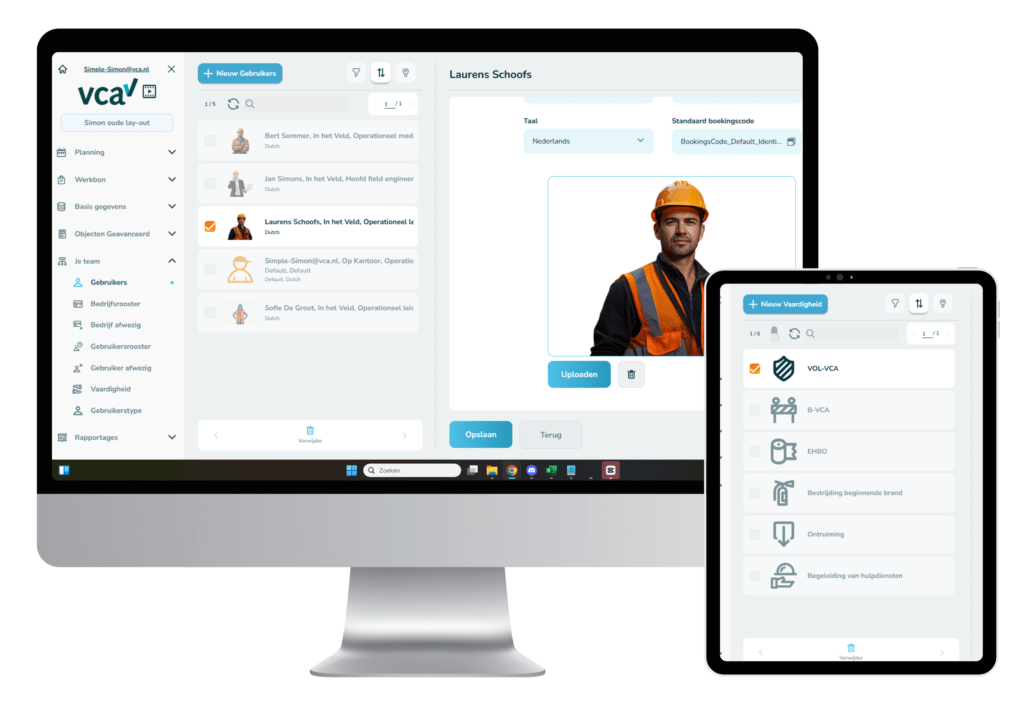Do you need to obtain a VCA certificate but aren’t sure where to start? Or are you constantly trying to keep track of employees’ diplomas to provide to clients? Or are you just tired of managing all your safety forms manually? We’ll address all of these questions in this article on VCAs, related safety forms (TRA and LMRA), and share tips on how to easily manage your VCA compliance digitally.
Everything you need to know about VCA, TRAs, and LMRAs (2025)
TLDR: How to simplify getting and retaining a VCA certificate
VCA certificates are essential for companies to keep their teams and customers safe while carrying out high-risk jobs. But successfully achieving and keeping a VCA certificate requires strict safety processes and ensuring your employees’ VCA diplomas are also up-to-date.
That’s where work order management software like Simple-Simon makes a real difference. The mobile app prompts technicians to complete required Tasks Risk Analysis (TRAs) and Last Minute Risk Analysis (LMRAs) before they start a job, ensuring these forms don’t get forgotten and are digitally stored, time-stamped, and linked to the specific job or customer.
This makes it easy to locate them during VCA or other audits, reduces the risk of incidents occurring, and also gives office staff real-time visibility into what’s happening on-site. Once granted, VCA certificates are valid for 3 years but require annual audits.
Plus, Simple-Simon also includes a VCA register that allows office teams to easily track employee and contractors’ VCA diplomas. Individual VCA diplomas are valid for 10 years once you pass the exam.
What is VCA?
VCA stands for Veiligheid, Gezondheid en Milieu Checklist Aannemers and is a widely used safety management system across the Netherlands and Belgium with over 1.5 million certified professionals and 15,000 certified companies. It’s also known as the SCC (Safety, Health and Environment (SHE) Checklist for Contractors) in English,
The VCA aims to create safer working environments in high-risk sectors like construction, installation, and maintenance, and there are multiple types of VCA certificates and diplomas depending on whether you’re getting certified as a company or an individual, the company size, activities, and risk profile.
Getting a VCA certificate as a company
While some companies may voluntarily opt to get VCA-certified, if you work in high-risk sectors like construction or maintenance, it’s quite likely you’ll need a VCA certification to qualify for client contracts. Here are the three types of VCA certification for companies:
- VCA*: for subcontractors with fewer employees and no direct managerial role.
- VCA**: for companies that manage projects and subcontractors.
- VCA-Petrochemie: for large multinationals or companies, mainly in the petrochemical industry.
To get certified, companies need to comply with the VCA checklist, and manage their safety processes, systems and documentation—including TRAs and LMRA forms—effectively. If they pass the audit they’ll receive a VCA certificate that is valid for 3 years with interim audits on a yearly basis.
Simple-Simon enables companies to easily customise these safety-related forms, remind technicians to complete them before jobs, and manage the entire process digitally. This not only saves time and simplifies the process for office and field staff, but also means companies can stay compliant with the VCA and successfully pass the certification and interim audits.
Managing your employees’ VCA diplomas
Individuals who work for companies that are required to have a VCA certificate often also need an individual VCA diploma to work on certain jobs. This requires the individual completing a VCA training course and passing the test. Employers are responsible for ensuring they only permit certified employees to enter clients’ sites, and providing proof of VCA diploma as needed.
But managing your employees’ and contractors’ VCA diplomas can be messy if you’re trying to track their diplomas manually and keep checking back on an excel sheet when you’re assigning technicians to a job. Instead, try using Simple-Simon to get a single view of your workforce’s certifications and get notified when they’re about to expire.
Barriers to VCA compliance
Even if you consider your company or yourself organised, implementing the processes and documentation needed to get and stay certified is a challenge, especially if you’re doing it manually. The most common barriers to VCA compliance are:
1. Paper overload
Safety forms like LMRAs and TRAs are often filled out on paper, which often get lost, forgotten or damaged (with spilt coffee often being the culprit). Paper forms also lead to inaccurate and incomplete safety assessments as employees rush between jobs and forget to fill in key details. This can be both a barrier to getting certified and a risk of losing your certification or clients if you cannot show historical records of these forms being completed for every job.
2. No centralized view
Office teams usually have limited insight into what’s happening on-site, relying on field staff to submit the relevant forms correctly and on time. This often causes frustration during audits when office staff have to spend hours searching for forms in their folders or chasing down missing forms. It also increases the risk of an employee or contractor entering a site without a valid VCA diploma, which poses a financial, safety, and reputational risk.
What is the role of TRAs and LMRAs in VCA certification
As we mentioned earlier, managing your TRA and LMRA forms properly is critical to VCA compliance and ensuring your employees act safely on-site. That’s why auditors and clients often ask to see completed TRAs and LMRAs as proof that you’re actually applying your safety processes in the field—and why you need to be able to locate them when asked.
What is a TRA?
A TRA, or a Task Risk Analysis, is a structured risk assessment carried out before starting complex, non-routine, or high-risk work e.g. working at height or with hazardous materials. It includes a description of the task, identified hazards, risk assessment, control measures, and approvals by authorised individuals.
A TRA must be completed before the job starts to ensure that everyone involved understands the potential risks, hazards, and control measures for the specific task(s) that will be carried out.
What is an LMRA?
A LMRA, or a Last Minute Risk Analysis, is a safety assessment that is performed on-site, right before a task is started. It’s basically a double check that the working conditions are as expected and safe enough to complete the task. For example, whether the ladder is stable, whether all individuals present have the relevant certification etc.
It normally takes just a minute or two, but skipping it can mean missing out on newly emerged risks and putting your staff in danger. VCA-certified companies are required to conduct and document LMRAs for every job.
How to manage your VCA compliance digitally
Preparing for a VCA audit and managing your compliance doesn’t have to involve endless paperwork, multiple versions of the same document, or spending hours chasing down field technicians for forms.
By digitalising safety forms like the TRA and the LMRA, you can save time, avoid stress, and make VCA certification and compliance much easier and hassle-free.
TRA and LMRA forms on the move
Field technicians are busy people who usually carry out multiple jobs in a day. Using digital TRA, LMRA, and other safety forms makes it much faster and easier for these technicians to complete forms on time while they’re on the move.
They can simply open their mobile app, review the relevant forms (like the TRA, which is completed before the job), complete new forms (like the LMRA), and submit any other data that is relevant to the job.
This isn’t just beneficial for field technicians, it also gives office staff real-time visibility of safety forms for a specific job or client. This helps flag incomplete or inaccurate forms, as well as if a form is missing for a job. Or, with Simple-Simon, companies can even set these forms as mandatory for certain jobs, so work orders cannot be created until the correct safety forms are also submitted.
It also makes preparing for a VCA audit much simpler as you can trust that all safety forms are completed, stored in the relevant client or job folder, and easily auditable.
Managing your VCA register
As well as managing safety forms digitally, it’s also now possible to manage your employees’ and contractors’ certificates in one place. This prevents inadvertently assigning non-qualified employees to complete jobs that need a VCA diploma, and also means you’re notified in advance if an individual’s diploma is expiring soon.
Having VCA diplomas for your team stored online also makes it faster and less hassle to provide proof of certification to new or existing clients when you start a job, as you don’t have to chase field technicians for it every time.
How Simple-Simon makes getting VCA certified easier
There are lots of software options available for managing your VCA compliance, but Simple-Simon is the preferred solution by hundreds of SMEs across sectors like maintenance, installation, construction, and security.
Why? Well, Simple-Simon offers a range of features that are designed to support VCA compliance, as well as help you manage your entire work order process. These features include:
- Centralised VCA recordkeeping: all safety forms, diplomas, and checklists are stored in one place and are linked directly to jobs, locations, or employees.
- Customisable forms: build your own TRA and LMRA templates to suit your job types, industries, or client-specific requirements.
- Mandatory LMRA/TRA before job start: field workers are prompted to complete safety forms before they can start a new job, ensuring the highest safety standards and compliance with the VCA principles.
- Audit-proof reporting: all records are automatically time-stamped, logged, and easy to find if your auditor or client asks for proof of VCA diploma or to see a completed TRA, LMRA, or other form.
Want to see how Simple-Simon can help you with your VCA? Or learn more about how companies like you are using Simple-Simon to save time and avoid double admin? Book a live demo with one of our work management experts!





